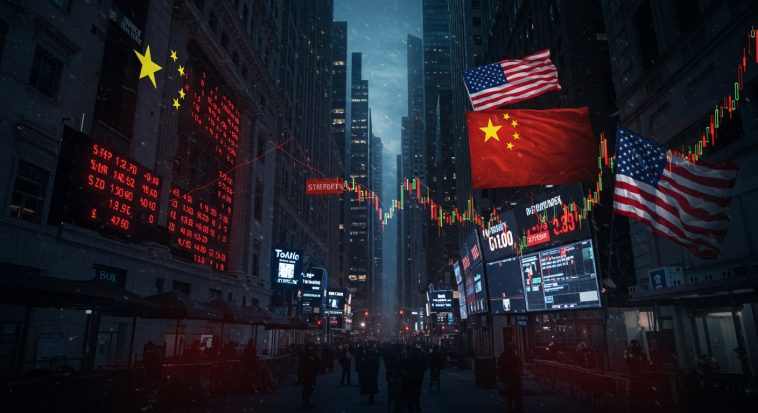In a week that may be remembered as one of the most pivotal for the global economy in decades, markets were rocked as President Donald Trump’s escalating global trade war sent shockwaves through financial systems worldwide. The devastating impact became clear as the Nasdaq plunged into bear market territory, with investors increasingly concerned that this global trade war could push the world economy into recession.
Global Trade War Reaches Dangerous New Heights
The situation intensified dramatically when China announced additional 34% duties on all U.S. imports, just days after Trump raised tariff barriers to their highest levels in over a century. This rapid escalation of the global trade war has created unprecedented market volatility not seen since the pandemic crash of 2020.
Unlike previous market crashes, this turmoil stems directly from policy decisions made with apparent awareness of the potential consequences. The resulting market reaction has been swift and severe:
- The S&P 500’s market capitalization plunged $5 trillion in just two days
- U.S. equity markets have lost nearly $8 trillion since Trump’s January inauguration
- Wall Street experienced its worst week since 2020
- The Nasdaq has fallen more than 20% from its December peak, officially entering bear market territory
Federal Reserve Caught in Global Trade War Crossfire
Federal Reserve Chair Jerome Powell finds himself in an increasingly difficult position amid the global trade war, facing both rising recession risks and increasing inflationary pressures. Despite apparent pressure from President Trump, Powell maintained a cautious “wait and see” approach, further unsettling markets.
Interest rate traders are clearly betting on significant monetary policy intervention, with four rate cuts fully priced in for this year. Some analysts even speculate about the possibility of an emergency inter-meeting rate cut if market conditions continue to deteriorate.
Historic Economic Impact of Global Trade War
The economic impact of this global trade war has reached historic proportions:
- U.S. tariffs now stand at their highest level in over 100 years
- JP Morgan analysts characterize the situation as effectively the biggest U.S. tax increase since 1968
- Barclays economists predict U.S. inflation exceeding 4% with GDP contraction in Q4
- Citi forecasts up to one percentage point reduction in eurozone growth, pushing the bloc near recession
- China’s growth could suffer a similar blow, potentially falling below 5%
Global Ripple Effects
The consequences of the global trade war extend far beyond equity markets. Oil prices have slumped dramatically, with Brent crude futures hitting a four-year low near $62 per barrel, now down 26% from a year ago. Even more telling, Swiss government bond yields briefly turned negative—a clear indicator of heightened investor anxiety.
As markets prepare for what promises to be another volatile week, governments worldwide are frantically working to de-escalate the situation while central bankers weigh their policy options. The weekend may provide a brief respite from trading, but diplomatic and financial channels remain active as officials grapple with the fallout from this unprecedented global trade war.



